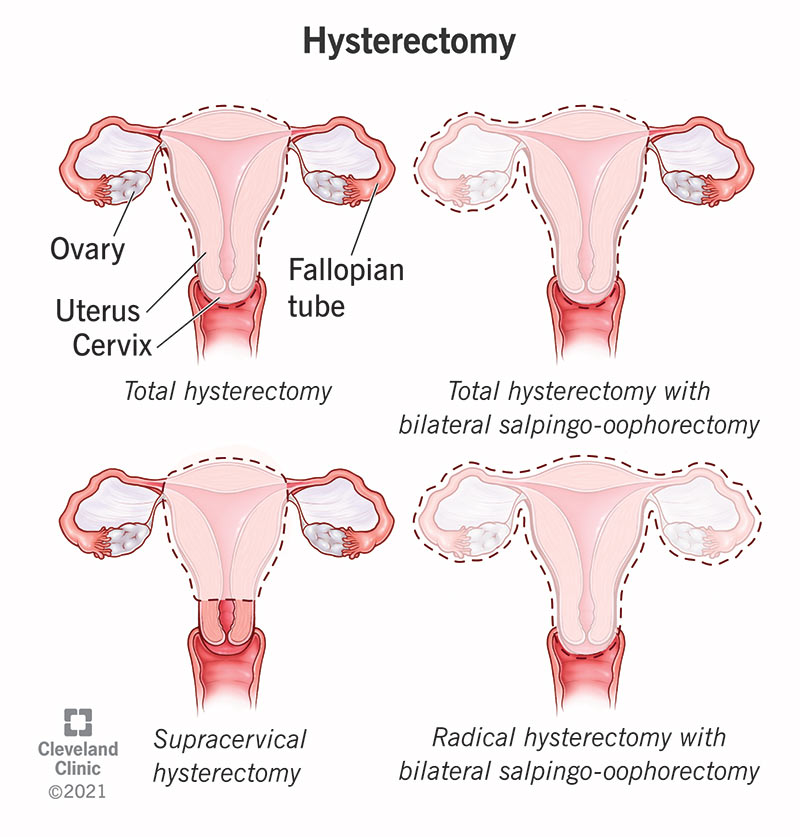
Hysterectomy - What It Is, Why It Is Performed, and What You Should Know
Introduction
Hysterectomy is a medical procedure involving the removal of the uterus. It may be recommended as a solution for treating conditions like uterine cancer, persistent pelvic pain, excess bleeding PCOS and or certain reproductive health issues. Understanding the reasons behind hysterectomy and its potential benefits is essential for individuals considering or undergoing this surgery.

Why is a Hysterectomy performed:
- Abnormal or heavy vaginal bleeding that isn’t managed by other treatment methods.
- Uterine conditions, including uterine cancer, fibroids causing pain or bleeding and endometriosis with tissue growth outside the uterus.
- Severe pain that is not managed by other treatment methods.
- For chronic pelvic pain that does not respond to other treatments, a hysterectomy may be considered a last resort
- Cancers: In cases of cervical, ovarian or other gynaecological cancers, a hysterectomy may be part of the treatment plan, especially if the cancer has not responded to other treatments or is in an advanced stage.
Normal risk of surgery:
- Major blood loss or blood clots like damage to surrounding tissues, including the bladder, urethra, blood vessels and nerves
- Infection during or post-surgery and bowel blockage
Advantages of having a Hysterectomy:
- Relief from pain and discomfort from conditions like fibroids or endometriosis, a hysterectomy can alleviate chronic pelvic pain and discomfort.
- Resolution of abnormal bleeding: If other treatments have failed to address abnormal uterine bleeding, a hysterectomy can provide a permanent solution.
- Lowers the risk of recurrence for conditions like uterine cancer when removal of the uterus is part of cancer treatment.
- Improved quality of life for individuals with debilitating symptoms, allowing them to resume normal activities without the constraints of their medical condition.
Consequences of having a Hysterectomy:
- Loss of fertility: Hysterectomy results in the permanent loss of the ability to conceive and bear children.
- Impact on hormones: Removal of the uterus may affect hormonal balance, potentially leading to menopausal symptoms.
Procedure of a Hysterectomy:
There are several types of hysterectomies. Your doctor will discuss the risks, benefits and potential side effects of each procedure. It’s important to ask your doctor if removal of the ovaries and fallopian tubes during your hysterectomy is recommended.
Types of Hysterectomies include:
- Total hysterectomy removes the entire uterus and the cervix (most common type).
- Partial hysterectomy (also called supracervical hysterectomy) removes only the uterus, leaving behind the cervix (research is ongoing about the risks and benefits of leaving the cervix intact).
- Radical hysterectomy removes the uterus, cervix and upper part of the vagina (usually for cancer treatment).
How long does it take to recover from a Hysterectomy:
Most people recover from a hysterectomy in about four to six weeks. Your recovery depends on the type of hysterectomy you had and how the surgery was performed. Recovering from a vaginal and laparoscopic hysterectomy takes less time than recovering from an abdominal hysterectomy.
Precautions after Hysterectomy surgery:
Besides rest and recovery, maintain hygiene and ensure wound dressing regularly. You can continue normal exercise, bathing and light work but do not lift heavy objects. Avoid sexual activity and use of tampons. By following doctors advice on medication and nutrition you can be back to normal after about six weeks.
What to expect after a Hysterectomy:
A hysterectomy is a major surgery with some permanent changes in your life. After a hysterectomy, you will no longer have menstrual periods or be able to conceive pregnant. You will feel relieved of the symptoms that prompted your surgery in the first place. You may also feel emotional side effects due to the permanent changes which could trigger complicated and confusing emotions. This is normal, there are support groups like Hystersisters may help you navigate these emotions.
 Back
Back